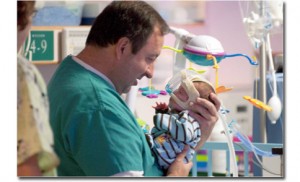 A new study finds that the respiratory therapists can help improve the detection rate of people with Alpha-1 Antitrypsin Deficiency. The year-long study aimed at detecting people with Alpha-1 referred for testing by RTs and the genotype distribution of referred people found to have Alpha-1. The study authors hypothesized that trained RTs could promote Alpha-1 testing, and in doing so, improve detection of those affected in the course of their routine practices.
A new study finds that the respiratory therapists can help improve the detection rate of people with Alpha-1 Antitrypsin Deficiency. The year-long study aimed at detecting people with Alpha-1 referred for testing by RTs and the genotype distribution of referred people found to have Alpha-1. The study authors hypothesized that trained RTs could promote Alpha-1 testing, and in doing so, improve detection of those affected in the course of their routine practices.
The study also considered that RTs can be at the front line of care for patients in pulmonary laboratories, rehabilitation, and post-acute settings, where they are in a position to see and recommend testing for at-risk patients. They reasoned that because many patients with chronic obstructive pulmonary disease (COPD) see healthcare providers other than pulmonologists and RTs have been shown to effectively participate in diagnosing patients with Alpha-1, the RTs could help identify previously unrecognized patients with Alpha-1-related COPD.
Coupled with the availability of free, confidential, at-home testing for Alpha-1 through the Alpha-1 Coded Testing (ACT) Study, there was an opportunity to assess whether trained RTs referred COPD patients for Alpha-1 testing and determine the yield of identification by RTs of those who are severely alpha-1 antitrypsin deficient. Outcome measures include the number of trained RTs and the rate at which trained RTs recommended Alpha-1 testing to their patients, as well as the rate at which such tested patients were found to have Alpha-1.
The main findings show that RT education programs that instruct RTs regarding Alpha-1 diagnosis and management were more widely used in the first year of implementation than those who did not receive such training, and that, despite only a small number of submitted specimens over the years of study, the yield of detecting individuals with severe Alpha-1 antitrypsin deficiency was 3.2% higher than in many previously reported targeted detection studies. In addition, the yield of detecting MZ individuals was very high, at 24.2%.
The authors behind the study concluded that, to the extent, the rate of detecting severely alpha-1 antitrypsin deficient patients here exceeds that in prior reports of targeted testing, the findings support the idea that respiratory therapists play important roles in improving detection of people with Alpha-1, and that training RTs is an effective measure to enhance Alpha-1 detection.
